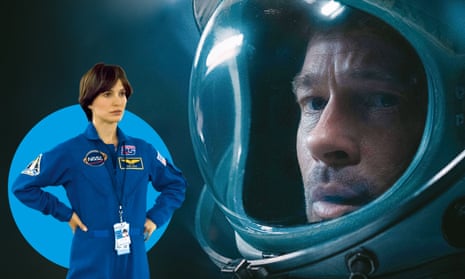Brad Pitt has not minced his words while talking about his new space epic Ad Astra, in which he plays a stoic, closed-off astronaut with daddy issues. “What we were really digging at … was this definition of masculinity,” he recently stated, and lamented “having grown up in an era where we were taught to be strong, not show weakness, don’t be disrespected”. That is bang on-message with #MeToo Hollywood, but Ad Astra also brings home how gendered the space film has always been.
Factually minded films from this genre – The Right Stuff, Apollo 13, First Man – have had little choice but to reflect the male-dominated reality, but men have also dominated the more far-fetched solo missions (Moon, The Martian) and team efforts such as 2001 or Space Cowboys. The latter hit the nail on the head. The final frontier was an extension of the wild western one: a realm of macho ruggedness, where any hint of emotion could jeopardise the mission. This was man’s work; women could make do with “concerned wife back on Earth” roles. And if this made for somewhat dull heroes, blame Nasa’s psychological screening programme. Women in space have often been overstated counters to all this testosterone: emotional, intuitive, vulnerable; more likely to be found in their underwear. Think of Sandra Bullock and her zero-gravity tears in Gravity, or Jodie Foster in Contact. Even Sigourney Weaver’s Ripley started off as a vulnerable female (in her underwear) in Alien.
Next up, Lucy in the Sky sees Natalie Portman as a Nasa astronaut transformed by her first mission and desperate to return, although her affair with colleague Jon Hamm leads to gossip about her “inconsistency”. Eva Green is also training as an astronaut in new movie Proxima, but she is pulled back to Earth by her attachment to her daughter. In both cases, these women are out of place in this manliest of men’s worlds. Lucy in the Sky is loosely based on Lisa Nowak, a Nasa astronaut who was charged in 2007 with attempted kidnap of her Nasa lover’s girlfriend, but veteran astronaut Marsha Ivins has already pushed back against the movie, questioning why this rare story about a female astronaut opted to show one losing her marbles.
Could the answer lie behind the camera? Apart from Proxima, all of these films were directed and written by men. This year we have had one of the first genuine female-made space movies: Claire Denis’ High Life, and look how it blew those gender frontiers apart with Juliette Binoche as a sexually voracious scientist and Robert Pattinson as a gentle dad. There has always been a more enlightened strain of space film – from Star Trek to Interstellar – but it is often set far into the future. We might be getting closer, but that time still feels lightyears away.










